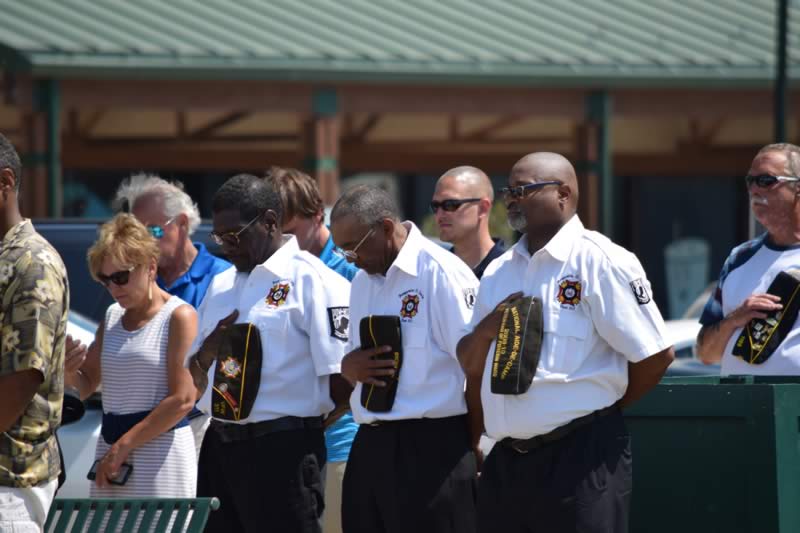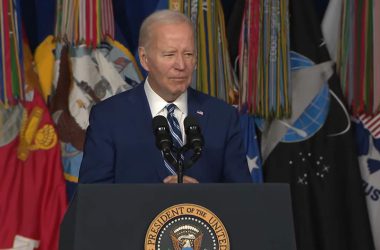Joint Base Andrews, Maryland—(ENEWSPF)—January 16, 2015.
SECRETARY OF DEFENSE CHUCK HAGEL: Thank you, Madam Secretary. Thank you. Thank you for your introduction.
Thank you for your leadership and what you have done in your role as secretary of the Air Force, your personal provision to this effort.
You want me to use the microphone? (Laughter.)
Any time a chief hands you a microphone, you use it, right? (Laughter.) Thank you.
I hope everybody got that. I just thanked your secretary of the Air Force. (Laughter.) In glowing terms, in case you missed it.
But I — I do really, truly appreciate, we all do, the work of Secretary James and her commitment to all of you and to this institution: in particular to this issue that you have spent the week working on. Your lives, your professions, which you are committed to.
I also want to recognize General Welsh – I know he’s not here – for his leadership. General Spencer as well. General Grosso — I saw her somewhere. There she is. Thank you, all our senior leadership in the Air Force, for their not just professional commitment and leadership, but their personal commitment and leadership.
This is an issue, sexual assault, that has to be personal because it’s a crime. But of all the crimes out there, sexual assault is one of the worst, because it is personal. And in our family, in the military, we are a unique community. You all know that. You make it so.
That raises a standard for us: a standard of expectation, a standard of requirements, and a personal standard to commit to each other. We take care of each other in the battlefield. We take care of each other in combat, in every situation. We should fundamentally begin taking care of each other in personal relationships and wherever else it is.
And if we don’t understand that dimension of this crime, then we will miss the whole point. And no matter how many laws or how many restrictions or how many directives and how much we apply in resources, it won’t get fixed, and it won’t be an Air Force or a military free of sexual assault unless we come at it from a basis of the humanity…of the force and help of the community.
We have to trust each other. We trust each other again in combat and every situation, but we take care of each other. We trust each other all the way through.
What you are doing — what you are doing every day is so critically important to that. It isn’t just because of your leadership and because of the focus of your offices and your responsibilities and your assignments, but something that the secretary noted – and we all understand this – but it is the mentoring for each other. It is the accountability we, as individuals, have for each other…beginning with ourselves. Accountability is the one system that does work in life. Whether you’re a parent or you’re a spouse, regardless of your profession, everyone is accountable. And that is as it should be.
Everybody is accountable for their behavior, for their actions, their leadership, and for their performance.
And so, if we come at it that way, the accountability that we each have, and then the accountability of our structure, then we’re off in the right direction. And then we’ll – we’ll fix it.
We have had encouraging progress over the last year in particular. We’re not where we need to be. We know from the latest surveys that came out that one of the areas that – in particular that we’re going to have to work harder on is retaliation, social retaliation, unfairly put on the victims.
You could pass all the laws you want. That isn’t going to fix the problem of retaliation. Retaliation comes in an environment. If an environment allows that to happen, because the personal commitment of the individual allows it to happen, then it won’t get fixed.
Now, we’ve got to come at it in every way. What we have been particularly focused on, on how we have – we being not just the Air Force, but the entire military enterprise, all the services with the accountability chain, the command chain – set an environment — set an environment, the right environment. Personal responsibility. Personal accountability.
All those things have to integrate into the larger scope of how we fix this – how we fix this problem.
One of the things that I’m particularly grateful for and proud of as secretary of defense the last couple of years is how the military has stepped up to this and said “yes, we’ve got a problem.”
We haven’t run from it; we haven’t tried to hide it. We’ve been more forthcoming, more direct, more transparent than any institution, certainly in this country, probably in the world.
We’ve got a problem. The problem itself is the beginning, not the end. The next part of that is how do you fix the problem. How does it get fixed?
And we’ve come at this in aggressive ways, I think smart ways, committed ways. And not because of me or Secretary James or any of your leaders, but because of you.
I spend a lot of time out and around this country and on many bases. I just came back last night from three days, different bases. Around the world – and I meet always privately and in large groups with our junior enlisted, junior officers, not just our leaders, but also the junior members of our military. What do they think?
What do the junior enlisted think about what’s going on? What’s right? What’s wrong? What can we do better? What should we not be doing? And how do we fix this? And until we get that buy-in – as you all know, it’s what you do every day, you’re committed to, from everyone in our military – we won’t fix it.
And that’s been a particular focus on everything that we have done and continue to do as we have adjusted what works, what doesn’t work, what can we do better? We’ll continue to do – to do that. But I want to also add one specific point on what we have been doing, and that is: I believe today as strongly as I did two years ago and maybe more so, that you cannot take the responsibility and the accountability for this out of the chain of command.
I remember saying to the president of the United States more than a year ago – it was in the spring of last year when we started a particular focus, the White House, the president’s efforts, what he has done personally, the vice president, we were discussing this.
I said, “Mr. President, this problem that we are dealing with here in this institution resides in this institution. Yes, it isn’t — it isn’t just in the military, sexual assault. It’s in every community across this country and every institution. But we have a unique opportunity because of how we are structured, how we are organized: an opportunity that gives us possibilities and avenues of approach to this that no other institution or community of families has. Because it — this particular issue resides within our community, it has to get fixed in the community. It has to be fixed, will be fixed, in the institution. You can pass laws, you can do all these things outside the institution…”
And we have worked with the Congress. We have worked with the president. We have worked with outside groups. We need help. We have been getting help. But we have got to fix this problem. It won’t get fixed in the Congress, in the White House, or anywhere else. We’ve got to do it. And there’s no – no group of people more committed to do that than the people in the military themselves, regardless of your rank, regardless of your service.
That is very unique. This institution’s unique. No institution in the world like the American military enterprise. And you all know that. You’re called upon to do things no one else has ever been called upon to do. You’re called upon to make commitments and sacrifices in your families that no one has ever [been] asked to do. You are the most professional group and enterprise across the board that we have in our country, bar none, and I say that not just on the strength of degrees or education.
Yes, it’s – you are the best-educated military the world’s ever known. But you’re the best-trained, you’re the best-led, you’re the most motivated. You have skill sets that we have never seen before.
And I go back to where I began. You set for yourself a personally high standard. We have high standards in the military for conduct, for behavior, for professionalism. That’s as it should be. And if you’re not willing to meet those standards of professionalism, that’s okay, that’s your choice. But there’s not a place for you.
But we start though, before you hit those military standards and expectations, you start with yourself. You wouldn’t be here if you didn’t have those high standards for yourself. And that’s where you compete always. You – you – each of us are our own most significant competitor. And we compete with ourselves for personal behavior and high personal standards. And we don’t want to lose that.
And that’s where we start with this issue, with everything we do, what you do, everything you are, the role modeling, the mentoring, the personal relationships.
One of the points that I know has been made by you, made to me all the time as I sit down with our young men and women all over the world in the military, is how important it is to protect each other in every situation.
If you see something, if you sense something, it’s your responsibility to step in and deal with it. Stop it. Or if you can’t stop it, get somebody who will stop it.
Be aware. Don’t walk away.
That probably is the most significant thing we can do to stop sexual assault in the military.
Yes, we need all the other dimensions of enforcement and what you are doing, what you’ve been talking about this week. But having the personal awareness of situations when we are in all different kinds of situations at different times, to be able to say, no, I’ve got a bad feeling where this is going, whether it’s you or someone else. Do something about it.
And we fail each other and we fail our own standards if we don’t do that. If we don’t do that.
You know that. And I know this week’s been an important week for all of you. And I think it’s so important that we have these kinds of opportunities to come together to exchange ideas. As Secretary James told me when I walked in a few minutes ago, the list of ideas that’s come out of this week, that you have shared with each other, things that have worked for you, that you’ve been able to tell your colleagues, little things, because little things matter. Little things matter.
Rarely do you fix a problem by one big thing. That hardly ever happens. It can’t happen. It’s an evolution of little things coming together. That’s the way we are in our own lives. In our own lives. And this is a personal issue, as I said and you know it as well as anyone.
So, thank you, very, very much for what you’re doing, what you continue to do. You are building a legacy. You are representing the military, particularly the Air Force, in a way that is going to have tremendous consequences and effects for the future.
You are role models. And I’ve always believed that leaders – and you’re all leaders, regardless of your rank, regardless of your age, or you wouldn’t be in these jobs – your most important responsibility is to be a role model. And you think about your own lives. There’s not one of us in this room who is not here as a result of…someone who affected or influenced your life. You’ve had role models. I’ve had role models. People you admire, people that you’ve looked to, people that you’ve listened to, people that you thought, “I’d like to emulate them in some way.”
I don’t want you to be somebody else. You don’t want to be somebody else. We are all unique. We are all unique. God made only just one of you.
So be who you are. But you – but you are shaped and formed by those who affect you and influence you and impress you. And remember always that what you’re doing now, and all the jobs you’ve had, and particularly the jobs you will have, you will be shaping people’s lives. People will be watching you.
And I think that’s important to remind all of our people, all the time. And it does affect this issue.
Do you want to be remembered as the guy who perpetrated some kind of a sexual assault or comment or whatever? Do you want to be remembered for that?
I don’t think so. So, role models and what you want to be remembered for and what kind of person you want to be – need to be reminded to other people as well. And that’s the way we influence people. That’s the way we influence people. One-on-one. One-by-one-by-one.
And you all have that unique responsibility, but you’ve also got that unique opportunity to do that.
So again, thank you. Madam Secretary, thanks for your tremendous leadership. And Larry and General Welsh and all of you for what you – what you do. And General [Grosso], thank you. I see a lot of familiar faces here who have been so committed and so involved that we couldn’t do this without you. Keep doing it.
And on a more personal note, this has been an issue, as Secretary James said, that I have been committed to because I think it is as essential to the health of the force as there is. I don’t know of one issue that’s more essential to the health of our force and the future of our force: mothers and fathers thinking about sending their daughters and their sons into the military.
Do I want my daughter to be in the military or my son? Because if this cloud hangs over the military, we don’t want that. We don’t want a parent out there concerned about their daughter or their son going into the military because of this issue. We want to be the ones that fixed it.
And one last point on this: college campuses, other areas that are dealing with this issue, are looking to us, are looking to the military, for help. They’re looking to us because we have institutionalized this as a huge challenge and a priority for who we are. They’re looking to us for the best ways to do that. And that’s a big responsibility, too.
But it also should tell us something about who we are and how we’ve done it. We’re not where we need to be yet. We know that. Got a lot of work to do. But we have come a long way. And it’s been because of you.
So, much continued success. One last personal comment: I can’t tell you how proud I’ve been to serve with you and be part of your team the last two years. And I wish you all much success.
Thank you. (Applause.)
Source: defense.gov








